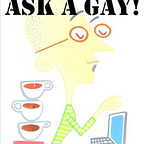What Do Married Gays and Lesbians Call Their Spouses?
Dear Hank:
One of my friends married his boyfriend a few years ago in New York City (I actually attended the wedding, and it was pretty amazing). Now David introduces Clay as his “husband.” Gotta tell ya, it makes me want to ask if David is the wife. (And that leads me to inappropriate thoughts about sexual positions). I haven’t had the nerve to ask, because it seems like none of my business, but do gay and lesbian people who get married struggle with what to call their spouses? Husband? Wife? Significant Other? Partner? None of those words sound quite right to a straight (and happily single) guy like me.
Matt Remoni
Dear Matt:
Before same-sex marriage became legal, I used the term POSSLQ (“possel q”) to describe committed same-sex partners, which I defined as those who share a bed with some regularity.
POSSLQ is a term used by the U.S. Census Bureau since the 1970s to describe “persons of the opposite sex sharing living quarters.” But I decided it also could be read to mean “persons of the same sex sharing living quarters.” One of the reasons I liked the term, I must admit, is the allusion to possums tickled my native Tarheel imagination. (Q: In North Carolina, what do you call a dead possum on a highway? A: Dinner).
But it’s not a term that seems to have stuck.
These days, more and more of the POSSLQs who play on my team aren’t just sharing the same bed — they’re shackled by law, like your friends David and Clay. They are, legally, spouses, and so there’s some pressure to come up with a new term to describe the situation — something sweeter than “indentured servant” and less moony than “life partner.”
In conversations with my gay and lesbian married friends, I find they all struggle with how to describe one another to third parties. “Partner” sounds very businesslike. “Significant other” does make clear that there’s actually a tie that binds. And, at least for me, “husband” has all the wrong allusions. It comes from the Old English “husbonda,” which means “male head of household,” and thus doesn’t imply equality in a relationship.
Also, “husband” is the term used to describe the male partner in an opposite-sex marriage, as “wife” does the female partner. I worry that using it takes us another step toward becoming so totally assimilated into hetero culture that we’ll all be playing golf and watching the Super Bowl in another 10 years instead of watching “Glee” and the Oscars.
Given that I’m single, this isn’t an issue that I personally have to grapple with at the moment (although please let me note that my ring size is 2.25 and I prefer platinum to silver or gold). But if I were betrothed, the term I’d likely use to describe my other half is “mate.” I know that wouldn’t work in Australia or the UK, where “mate” means the same thing as any one of three words in America: “bo” (in the Southern U.S.), “bro” (in urban America). or “man” (as in “hey man,” used pretty much everywhere). But it’s a term rarely used in the United States, and I like it because it suggests both a sexual connection and a long-term connection. Also, I think it can be used by lesbians and gay men.
So yes, Matt, as my meandering probably makes clear, we are still struggling with what to call our married selves. Maybe the Human Rights Campaign, one of the more prominent same-sex marriage advocates, could sponsor a contest to come up with a term we all can embrace.
I’m thinking that a great prize would be an all-expenses-paid trip to Las Vegas, a great place for both a quick marriage and a quick divorce!
Gaily yours,
Hank
Questions you can’t bring yourself to ask your gay friends and neighbors? Or maybe you’re just queer and befuddled. Send them to Hank@AskAGay.net. (Warning: The answers will be factually correct, but might not be politically correct)
